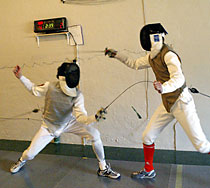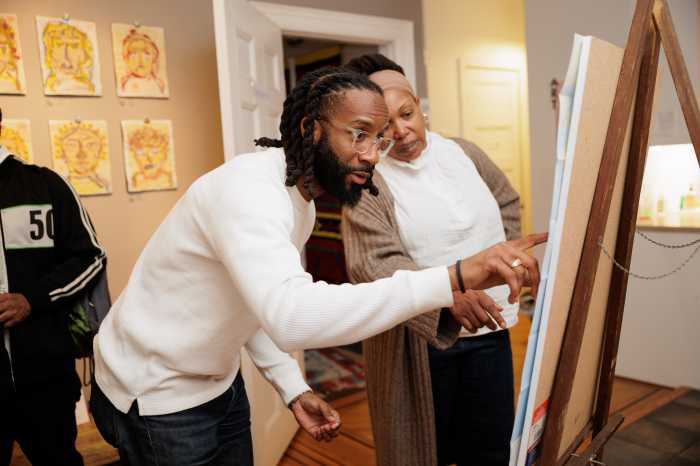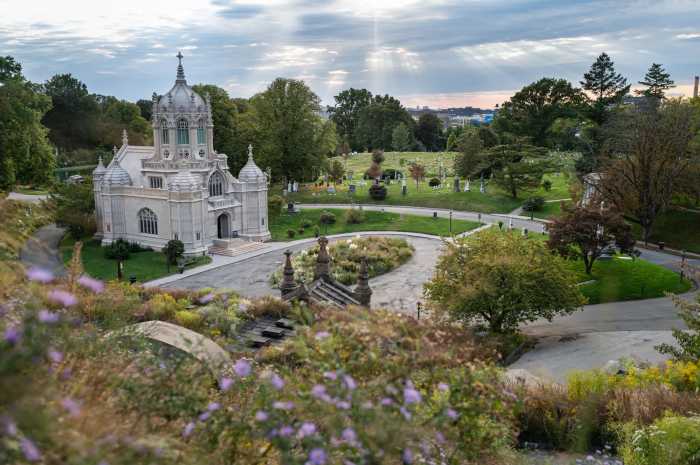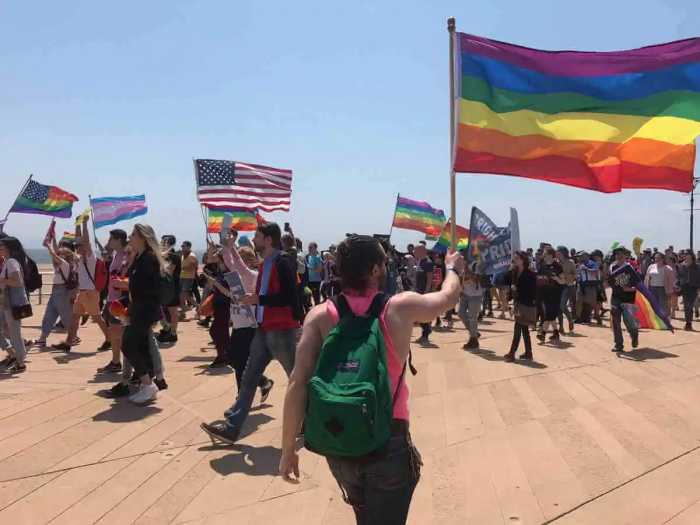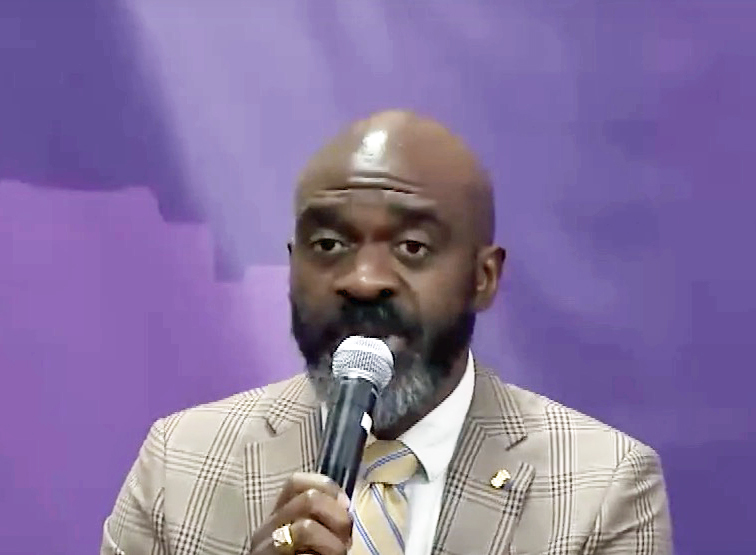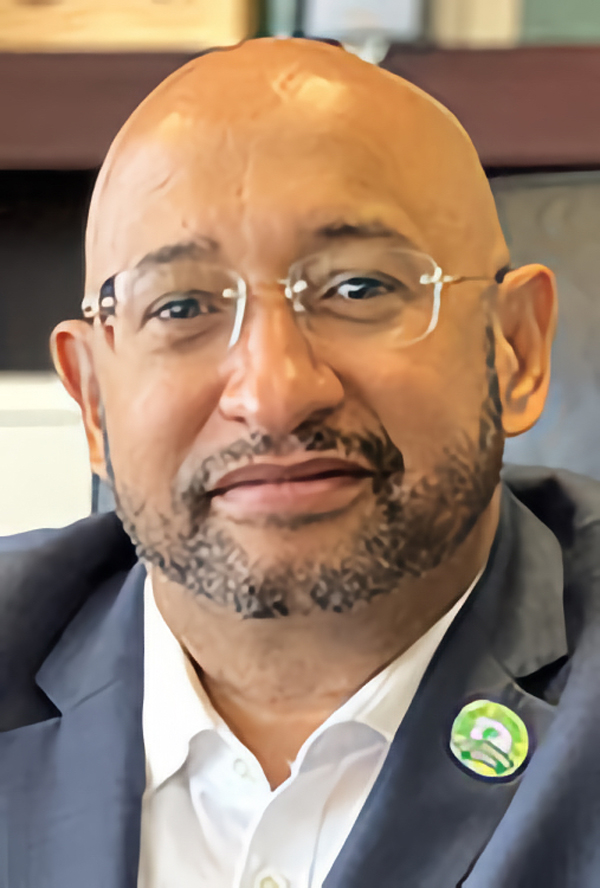If it seems that there are more swashbuckling
rogues walking the streets of Carroll Gardens these days, they’re
there at the invitation of Rolando Balboa, founder of the Brooklyn
Fencing Center, which relocated from Atlantic Avenue to a spacious
permanent facility on the edge of the neighborhood last month.
Balboa hopes to not only train Brooklynites of all ages, but
also to put the fringe sport on the map.
After a nearly two-year hiatus, Balboa opened the doors of his
new center by holding a three-weapon competition, the Porcupine
Open, on Sept. 26. More than 120 fencers competed in the event,
he told GO Brooklyn.
"Fencing is a wonderful sport," said Balboa, 34, who
hails from Bolivia. "It requires a lot of movement and a
lot of dedication."
A typical Brooklynite is more likely to discuss the previous
day’s football, or even bocce game, than fencing techniques,
so it would not be unreasonable for locals to question the fiscal
viability of Balboa’s plan to train curious blue-collar folk
in what has been traditionally known as a sport for blue bloods.
But Balboa blames his sport’s lack of popularity on its lack
of media attention. With his new facility and fencing’s recent
exposure in the news as part of the Olympic Games in Athens –
and more notably the success of the USA team – he remains optimistic
that fencing will gain in popularity in years to come.
"Before, you wouldn’t even see fencing on TV," said
Balboa. "It will take a while – five years, 10 years, whatever."
He equates the strong work ethic involved in fencing to that
of karate.
"You really have to love the sport," said Balboa. "You
cannot be lazy. You cannot just go in there and attack."
The adult program at Brooklyn Fencing Center features two separate
beginner-level classes, a mixed saber (using this light fencing
sword with a tapered flexible blade with a cutting edge on one
side and on the tip), a junior epee and a mixed epee class. The
epee is a sword with a bowl-shaped guard and a long, narrow,
fluted blade that does not have a cutting edge and tapers to
a blunted point. For the first time in the history of New York
City fencing, says Rachel Fedde, a center employee, the center
will be offering a fencing class to toddlers as young as 3 1/2.
"I decided to have a little group of little kids,"
said Balboa. "Something more specific for them where it’s
not going to be as strange."
Junior beginner and junior intermediate classes for kids ages
9-16 are also offered.
Accordingly, Balboa assures parents that their children will
be safe from any physical harm.
"By tradition, everybody has to start on foil," Balboa
said of the thin, flexible four-sided blade with a button tip
(to prevent injury) used by beginning fencers. "[But] we’re
trying to switch towards saber." He considers fencing one
of the "safest sports out there."
He describes his former Atlantic Avenue facility as a "30-foot
by 12-inch dance studio." But his new center, under construction
in Carroll Gardens since January 2003, boasts features absent
from its predecessor, including nine Olympic-style fencing strips,
locker rooms, a weight room, a full-service armory for weapons-repair,
and even a lounge and a section for spectators.
Balboa, who has been fencing for 10 years, has temporarily sacrificed
his own training to bring the sport to the Brooklyn community.
He started fencing at a relatively late age – 23 years old –
after a friend recommended that he join the Hunter College fencing
team. Balboa won a gold medal in the 1999-2000 team Summer Nationals
as a backup for the Metropolis Fencing Club; and in 2000-2001
he finished third in the individual summer nationals; and he
has also received two silver medals in the Empire State Games.
As a veteran of the sport, Balboa wants to pave the way for a
future generation of fencers and is convinced that the center
will help increase the sport’s visibility.
His priority is to introduce fencing to the community so they
may become part of a new breed of professional fencers such as
individuals in the USA women’s saber team, which took home gold
and bronze medals from Athens, and the men’s foil team, which
came in fourth.
The main advantage of his center’s new digs is its increased
space. The 5,000 square feet allows for more fencing classes
for both private lessons and groups.
And with a more spacious venue, Balboa is confident that people
will take him and the sport seriously. He added that, while he
remains competitive with the other fencing clubs in the five
boroughs (a meager six, according to the New York Fencing Club
Directory), "We need more clubs in the city."
It remains to be seen whether the adult, teen and toddlers’ fencing
programs at the Brooklyn Fencing Center will catch on and appeal
to residents. If so, Balboa will not only have founded the lone
fencing center in Brooklyn, but will have become the instructor
of its first generation of fencers.
"I think we are in third place right now," he said.
"The ultimate goal right now is to be one of the best in
New York City."
The Brooklyn Fencing Center is located
at 62 Fourth St. at Hoyt Street in Carroll Gardens. Group classes
cost $150 for a 10-class, five-week session. The floor fee is
$10, $15 with equipment rental. Private lessons are available
by appointment. For more information log on to www.brooklynfencing.com
or call (718) 522-5822.


